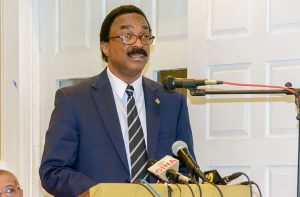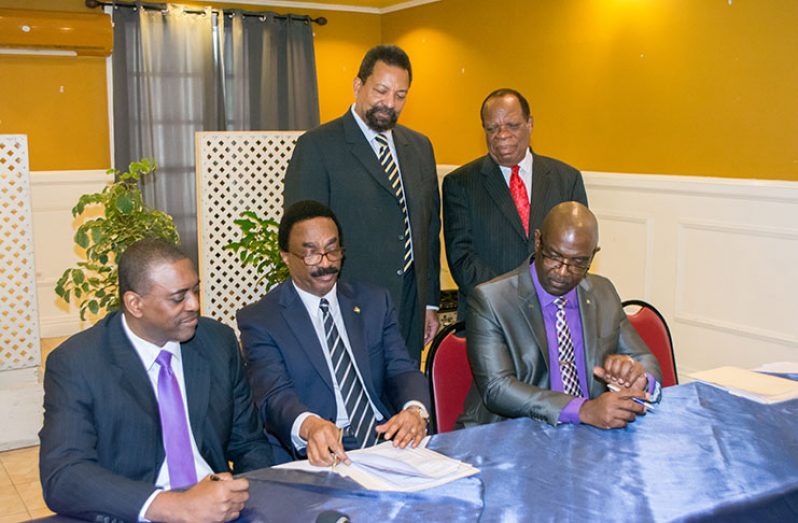GUYANA continues to make active strides in becoming the Region’s breadbasket, with the latest move paving the way for establishment of a local law school – approval for which was given more than 20 years ago. Just two years before the country is expected to commence oil production (2020), it will establish its very own law school, which will provide an opportunity for holders of a Bachelor of Laws (LLB) degree to acquire their Legal Education Certificate (LEC).
The school will bear the name JOF Haynes Law School of the Americas (JHLSA) after the late outstanding Guyanese Jurist, JOF Haynes. The process was initiated and formalised on Wednesday during the signing of a Memorandum of Understanding (MoU) between the Government of Guyana and the University College of the Caribbean (UCC) and Law College of the Americas (LCA), in what is described as a public-private partnership. The partnership was approved by Cabinet.
The Government of Guyana will hold 30 per cent shares, and will contribute only the land where the school is to be built, while its partner will hold 70 per cent shares and will foot all other costs. The school is likely to be located at Turkeyen, Greater Georgetown.
According to Attorney General (AG) and Minister of Legal Affairs, Basil Williams, SC, who signed on behalf of the Government, Guyana was given permission to establish the school over two decades ago by the Caribbean Legal Education Accreditation body, but this was never done by successive governments.
The country has, however, over the years resorted to sending 25 of its LLB holders to the Trinidad-based Hugh Wooding Law School (HWLS), while the others have been unable to practise law because of their inability to acquire the LEC. The hefty cost attached to acquisition of the LEC has been cited as one of the primary factors which have prevented students from acquiring an LEC. However, this school is expected to provide the same level of education at a cheaper cost compared to similar institutions across the Region.
In relation to the number of students who have not been able to get the LEC, Minister Williams lamented that the numbers have probably climbed to the thousands by now, which he said is “very unfortunate.”
Just last year, the AG brokered a deal to have the 25 Guyanese students accepted in the HWLS after inheriting a situation of uncertainty as it relates to placement of those students. And with the existing agreement expiring in 2018, he said that the law school is expected to be completed the same year, and will provide a long-term solution to the problem. He could not provide a numerical value for the project, since a feasibility study is yet to be done.
“So it was very important that this question of a law school be addressed. Dr Trevor

Hamilton of the University College of the Caribbean (UCC) sold us his idea, which I had to sell to Cabinet and I think that a bright future beckons for this law school,” Minister Williams said.
He expressed too, that he is confident, notwithstanding an impending feasibility study, that the school will be a success, since it will serve students from across the Region. JHLSA will operate under the Council of Legal Education which would then make it a law school with regional, regulated oversight. Having regional accreditation, graduates of the school would then be able to practise in jurisdictions across the Caribbean.
The minister also expounded on the broad-based approach the school will take, in terms of training prospective lawyers in non-traditional areas such as those dealing with cybercrimes.
NO FISCAL BURDEN ON GOV’T
Lauding the initiative too was the UCC’s Dr Trevor Hamilton, who added to Williams’s contention that the school will serve as more than just a hub for those wishing to be admitted to the bar. He emphasised the fact that as new economies emerge in the Caribbean, modern law practices and studies have emerged and the school will be designed to cater for such needs.
“Law is the catalyst for modernising any economy…. The establishment of this law school will provide opportunities for business” he said, pointing out that persons can benefit from investments in apartments for foreign students.
He explained too that the partnership will be operated as a business, which means there will not be a fiscal burden on the government to provide any form of subsidy. Dr Hamilton also reflected on the fact that students from the Region have to travel to South Africa to pursue their Masters. As such, he underscored the role of the school as not only an academic institution, but also as a mechanism for cultural integration.
Professor Dennis Gayle, Executive Chancellor of the UCC, also weighed in on the possibilities of the law school, noting that it will bridge the significant gaps between the demand for legal education in the Region and the provision of such education. He said one of the advantages of the school is that it will allow increased access for more law students, given the challenge of space availability at other law schools in the Caribbean.
Meanwhile, Education Minister Dr Rupert Roopnaraine, plugged the need for education to be a priority for any government, since he believes it is the foundation of all other sectors. Elated that such a school will boost the performance of his ministry, Dr Roopnaraine committed to providing support to ensure that this kind of modern education delivery is encouraged and fostered in Guyana.
“After so many years, it is satisfying and fulfilling to see this coming to fruition… and not to sound boastful, but there is much that Guyana has to offer that other Caribbean countries cannot, so this is a necessary step for us,” the minister said.
Speaking at the ceremony too were Courtney Wynter, Chair of the LCA, and University of Guyana’s (UG’s) deputy Vice-Chancellor, Barbara Reynolds, who both agreed that the introduction of this school into the education system in the Region will put many hearts at ease.
Wynter in particular emphasised that the strength of the institution will be its capacity to end the situation which caused qualified professionals to not explore legal practice, because of restrictions. He shared the belief that this agreement challenges historical practices.



.jpg)










